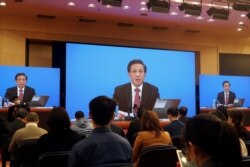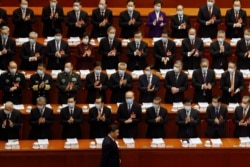A senior Chinese official on Thursday confirmed Beijing's intention to overhaul Hong Kong's electoral system to ensure "patriots" are in charge, potentially the biggest blow to the city's democracy since its handover from British rule in 1997.
Zhang Yesui, a spokesman for the National People's Congress, said that it had the constitutional power to "improve" Hong Kong's system and that a draft decision would be discussed during the annual parliamentary session, which opens Friday.
Hong Kong's Cable TV and Now TV, citing unnamed sources, said after Zhang spoke that the changes would include increasing the size of an election committee to select Hong Kong’s leader from 1,200 to 1,500, and the city's legislature from 70 to 90 seats.
Elections for Hong Kong's legislature will likely be deferred to September 2022, the South China Morning Post reported on Friday, citing unnamed sources.
Blow to democracy camp
Any reforms would deal the most severe blow yet to the democracy camp, just as 47 members, charged with subversion under a new national security law, were remanded in custody and mostly denied bail.
The moves are widely expected to deprive Hong Kong's democratic camp of any hope of winning a majority in the city's Legislative Council. Democrats have traditionally fared better than pro-Beijing groups in direct elections for "geographic" seats in the chamber, but these popularly elected seats look set to be diluted in the expanded body.
Beijing promised universal suffrage as an ultimate goal for Hong Kong in its mini-constitution, the Basic Law.
But with no moves toward full democracy, Hong Kong was rocked by months of sometimes violent anti-China protests in 2019, infuriating the Hong Kong government and Communist Party rulers in Beijing.
Hong Kong diplomats, businesspeople and political activists are watching developments closely, some fearing Beijing is keen to further thwart a democratic opposition already threatened by the parliament's imposition of the sweeping national security law cracking down on dissent last June.
Recent developments showed the electoral system "needs to be improved to keep up with the times" and to fully implement the principle of "patriots governing Hong Kong," NPC spokesman Zhang said.
The parliament had "supreme state power," he added, under the constitution in deciding on changes to Hong Kong's electoral system.
'Turning the clock back'
Hong Kong returned to Chinese rule with guarantees its widespread freedoms, extensive autonomy and capitalist way of life would continue under the "one country, two systems" model.
Political scientist Sonny Lo told Reuters the NPC's planned moves would lead to "reverse democratization."
"The democrats will be condemned to be a permanent minority under this system," he said.
"It will be a bitter lesson for them. ... It is turning the clock back and it will wipe out all the democratic progress" of the last years of colonial rule and the first two decades of Hong Kong under Chinese rule.
Some observers are bracing for moves to reduce democratic representation in the election committee and diminish their ability to nominate candidates to run for the highest office. The grouping must convene before Chief Executive Carrie Lam's five-year term ends in July 2022.
A broader use of patriotic oaths is also expected to enforce loyalty — action that has already been used to disqualify some democratic politicians from the legislature.
While critics say the security law has been used to crush dissent and curb freedoms, Beijing and Hong Kong officials say it was vital to end the 2019 violence — political action they say was partly manipulated by foreign governments.
A Hong Kong government spokesman backed the prospect of NPC action, saying that only through "patriots governing Hong Kong" could the Central Government's overall jurisdiction be implemented, securing the stability of the city.
More than 10,000 people were arrested after the 2019 unrest that saw protesters target China's liaison office in the city, state banks and local government buildings and setting fires and daubing graffiti over businesses seen as pro-China.







